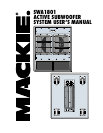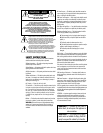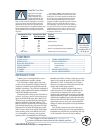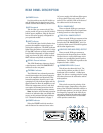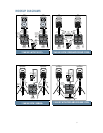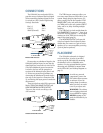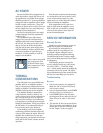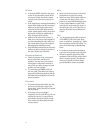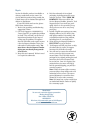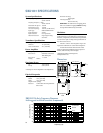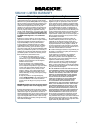8
No sound
• Is the input
LEVEL
control for the input
source or the subwoofer turned all the
way down? Verify that all the vol ume
controls in the system are properly ad-
just ed.
• Is the signal source working (and making
union scale)? Make sure the con nect ing
cables are in good repair and se cure ly
connected at both ends. Make sure the
output volume (gain) control on the mix-
ing console is turned up suf fi cient ly to
drive the inputs of the speaker.
• Make sure the mixer does not have a
Mute on or a Processor loop en gaged. If
you fi nd something like this, make sure
the volume/gain is turned down before
disengaging the offending switch.
• Is the thermal protection circuit ac ti vat ed?
Make sure there is at least six inches of
free space behind the SWA1801.
Poor bass performance
• Check the polarity of the connections
between the mixer and the loud-
speak ers. You may have your positive
and negative connections re versed at
one end of one cable, causing one loud-
speak er to be out-of-phase.
• Try switching the
PHASE
switch on
the rear panel. This affects the polarity
between the full-range speakers and the
SWA1801 and may improve the low-fre-
quency response.
Poor sound
• Is it loud and distorted? Make sure that
you’re not overdriving a stage in the
signal chain. Verify that all level controls
are set properly.
• Is the input connector plugged
com plete ly into the jack? Be sure all con-
nec tions are secure. It’s a good idea to
periodically clean all electrical con nec -
tions with a non-lu bri cat ing electrical
contact cleaner.
Noise
• Make sure all connections to the active
loudspeakers are good and sound.
• Make sure none of the signal cables are
routed near AC cables, power trans-
form ers, or other EMI-inducing devices.
• Is there a light dimmer or other SCR-
based device on the same AC cir cuit as
the SWA1801? Use an AC line fi lter or
plug the SWA1801 into a dif fer ent AC
circuit.
Hum
• Try dis con nect ing the cable connected
to the INPUT jack. If the noise dis ap -
pears, it could be a “ground loop,” rather
than a problem with the SWA1801. Try
some of the fol low ing trou ble shoot ing
ideas:
• Use balanced connections throughout
your system for the best noise rejection.
• Whenever possible, plug all the audio
equip ment’s linecords into outlets which
share a common ground. The dis tance
between the outlets and the common
ground should be as short as possible.



